|
|
|
Sort Order |
|
|
|
Items / Page
|
|
|
|
|
|
|
| Srl | Item |
| 1 |
ID:
120782
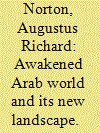

|
|
|
|
|
| Publication |
2013.
|
| Summary/Abstract |
The Arab Awakening augurs the return of political contestation to key Arab societies in which little more than token opposition had been tolerated. Unfolding experiments in democratisation in which Islamically-oriented parties are leading players are underway but the prospects for the consolidation of stable political systems in key counties, such as Egypt or Syria are problematic. These developments have hastened a new regional balance of power in which Saudi Arabia and its allies have sought to stem the tide of change as well as thwart the hegemonial ambitions of Iran. Persistent issues, particularly the Israel-Palestine conflict, remain unresolved and have a powerful grip on the conscience of the Arab world. Key external powers, especially the United States, confront not only stubborn familiar issues but also a host of new strategic, economic, diplomatic and military challenges.
|
|
|
|
|
|
|
|
|
|
|
|
|
|
|
|
| 2 |
ID:
120692
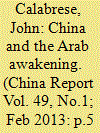

|
|
|
|
|
| Publication |
2013.
|
| Summary/Abstract |
The popular unrest that has swept the Arab World since January 2011-occurring as China entered a period of leadership succession and delicate economic adjustment-presented Beijing with both domestic political and diplomatic challenges. This article examines how, and how well, China responded to the Arab Awakening at home and in the conduct of its diplomacy.
|
|
|
|
|
|
|
|
|
|
|
|
|
|
|
|
| 3 |
ID:
125917
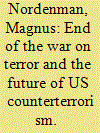

|
|
|
|
|
| Publication |
2013.
|
| Summary/Abstract |
The "Global War on Terror" came to dominate US foreign policy in the wake of the 9/11 attacks. The effort served as a guiding light for how the United States interacted with friends, allies, and adversaries and deeply influenced US priorities around the globe, in general, and in the wider Middle East, in particular. While it will likely never be announced as concluded, the Global War on Terror is effectively over, due to four separate but related reasons: the killing of Osama bin Laden, the perceived failure of counterinsurgency as an effective policy instrument, the significant costs of the effort, and the Arab Awakening. This does not mean, however, that the United States will no longer pursue counterterrorists. Drones and special forces have emerged as the key tools in US counterterrorism, and the United States is likely to continue pursuing terrorist cells and high-value targets aggressively across the globe for decades to come using these means. However, this practice should be viewed as one of many defense efforts that the United States carries out on a regular basis in order to guard the full range of US interests. Elements of the emerging US counterterrorism effort remain problematic, but the end of the Global War on Terror nevertheless presents Washington with a window of opportunity to reorder its relations with the nations and peoples of the Middle East and North Africa and frees up resources for the United States to tackle other emerging strategic priorities, such as the shift of global power to the Pacific, the revival of the US economy, and security challenges such as energy security and cyber defense.
|
|
|
|
|
|
|
|
|
|
|
|
|
|
|
|
| 4 |
ID:
144494
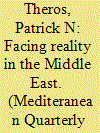

|
|
|
|
|
| Summary/Abstract |
The Arab Awakening (also known as the Arab Spring) caught the Western world, and even most experts, by surprise. A fuller understanding of how the peoples of the Middle East perceive their history and their relationship with the Western world—from their own perspective and not a Western analysis of that perspective—is a sine qua non to understanding what happened and how to begin to formulate policies and actions to deal with the new reality. The Islamic State has become the champion of disaffected Sunni Muslim youth building on those perceptions, and the West underestimates it at its peril.
|
|
|
|
|
|
|
|
|
|
|
|
|
|
|
|
| 5 |
ID:
148065
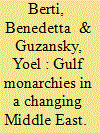

|
|
|
|
|
| Summary/Abstract |
More than three after the beginning of the Arab Awakening, it appears that the upheavals have, by and large, left the Gulf monarchies intact. While several dictators have fallen— from Ben Ali in Tunisia, Mubarak in Egypt and Gaddafi in Libya to Saleh in Yemen— monarchies across the region have shown considerable survival skills. But is this purported resilience likely to last even as the Arab Awakening continues to shake the Middle East and North African (MENA) region, or are the monarchs next in line now that the “presidents for life” have met their demise? This article explores the various ways in which Gulf monarchies have experienced political and social mobilizations associated with the Arab Awakening and then analyzes the characteristics that have allowed these countries to weather the storm, focusing on both pre-existing structural and cultural factors, as well as political responses to the unfolding regional protests.
|
|
|
|
|
|
|
|
|
|
|
|
|
|
|
|
| 6 |
ID:
119452
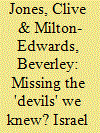

|
|
|
|
|
| Publication |
2013.
|
| Summary/Abstract |
While the immediate outcome of the Iraq War of 2003 was certainly to Israel's strategic advantage, the more immediate and indeed visceral challenge of the ongoing Al-Aqsa intifada has dominated the security horizons of most Israelis. The legacy of this conflict, with its strong Islamist overtones, has clearly had a bearing on how the Arab Awakening has come to be perceived by Israel.
Taking this experience as its starting point, this article examines the response by Tel Aviv to the Arab Awakening at an elite level and how, for the most part, Israeli perceptions of its Islamist essence, an essence that rejects popular accountability, continues to be viewed through a predominantly Realist prism. Such perceptions look set to endure, shaping Israel's immediate attitudes towards the Palestinians and the wider Arab world.
The authors argue that while Israeli concerns over the trajectory of the Arab Awakening do carry empirical weight, such concerns can be equally understood as part of a wider critique with regard to Israel's own emerging democratic deficit. This was seen most recently in a raft of legislative bills put before the Knesset between 2009 and 2012 designed to curb civil liberties in Israel; alongside its continued occupation of Palestinian lands and wider demographic shifts, such moves increasingly tarnish Israel's proud claim to be both Jewish and democratic.
|
|
|
|
|
|
|
|
|
|
|
|
|
|
|
|
| 7 |
ID:
121485


|
|
|
| 8 |
ID:
152883
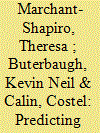

|
|
|
|
|
| Summary/Abstract |
This article is one of the first to systematically assess the ability of state fragility measures to predict violent protests and adverse regime changes in countries. We focus on the Arab Spring as an example of a situation that such measures ought to predict. Through a variety of analyses, we find that none of the measures are predictive. We then create a simple model using the literature of protest and revolts to predict both the level of violence and the extent of regime change in the Arab Spring countries. This simpler model does a better job of predicting the level of involvement in the Arab Spring than any of the complex State Fragility Indexes. Thus, the goal of this article is not to explain the causes of the Arab Spring, but to add to the discussion of the predictive value of measures of instability.
|
|
|
|
|
|
|
|
|
|
|
|
|
|
|
|
| 9 |
ID:
120990
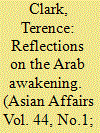

|
|
|
|
|
| Publication |
2013.
|
| Summary/Abstract |
One of the Society's Arabists analyses the course of the Arab Awakening, emphasising the difficulty of drawing general conclusions from events in a number of very different countries. He suggests that the newly-elected powers will now need to deliver on their promises in terms with which the West would be familiar-education, health, human rights and, above all, employment. These issues will play out in Arab terms and on the basis of Arab choices. The West needs to accept this, but remain engaged. The author concludes with a short description of UK efforts.
|
|
|
|
|
|
|
|
|
|
|
|
|
|
|
|
| 10 |
ID:
153092
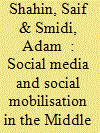

|
|
|
|
|
| Summary/Abstract |
The role of the media, and especially the social media, in the Arab Spring has been extensively debated in academia. This study presents a survey of studies published in scholarly journals on the subject since 2011. We find that the bulk of the research contends that social media enabled or facilitated the protests by providing voice to people in societies with mostly government-controlled legacy media; helping people connect, mobilise and organise demonstrations; and broadcasting protests to the world at large and gaining global support. Some scholars, however, argue that social media played only a limited or secondary role, which ought to be viewed alongside other social, political, economic and historical factors. We also identify the spatial and temporal focus of the research and preferred theoretical and methodological approaches and draw attention to several blind spots that require further investigation.
|
|
|
|
|
|
|
|
|
|
|
|
|
|
|
|
|
|
|
|
|